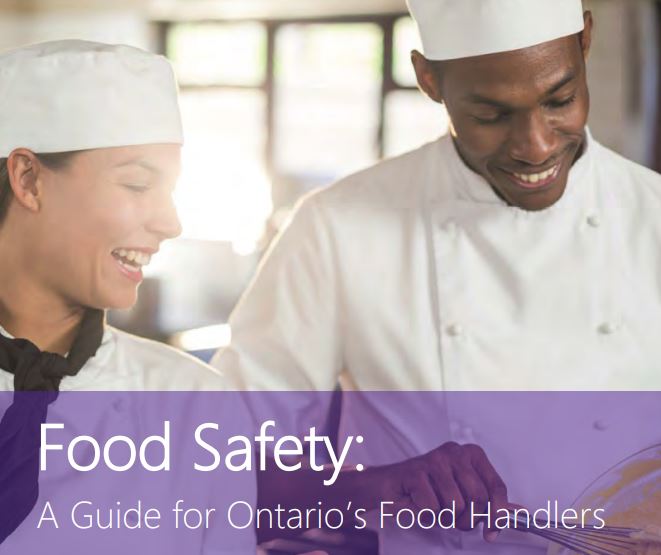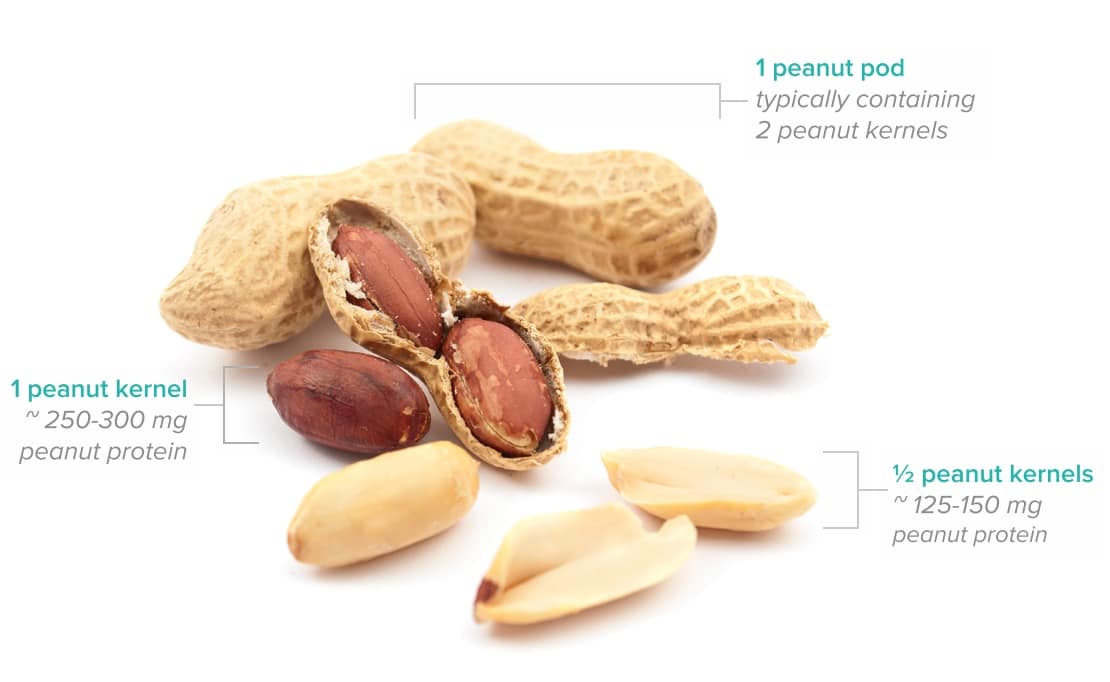Check out our advocacy in action this month – learn about the updated Ontario Food Handlers Guide which now provides a robust section on food allergy management because of our continuous advocacy efforts. Plus, we speak out about Air Canada’s treatment of a passenger with food allergy.
Discover the latest in food allergy peanut and wheat research. You’ll learn about Aimmune and DBV’s latest developments with their studies on peanut oral immunotherapy (OIT) and the peanut patch respectively. Plus, learn about the success of a recent study with wheat OIT, read a study on food allergy accommodations in Canadian schools – and our statement addressing this study.
You can also check out this month’s mythbuster on whether one allergy can be more serious than another.
Advocacy in foodservice: Updated allergen management information in Ontario’s Food Handlers Guide
 Last month, the Ontario Ministry of Health and Long-Term Care released its updated Food Handlers Guide. This guide is now available online for all public health units to use to train food handlers (any organization that prepares or sells food) in Ontario.
Last month, the Ontario Ministry of Health and Long-Term Care released its updated Food Handlers Guide. This guide is now available online for all public health units to use to train food handlers (any organization that prepares or sells food) in Ontario.
We have been working with the Ministry to update the information on food allergy and allergen management. As a result of our input, the updated guide now provides a more robust section on food allergy management (see pages 16-22).
This is an important step forward in our foodservice advocacy, as it means that in Ontario:
- There must now be one person per shift in all foodservice/restaurant operations who has taken a food handlers course and received their food handlers certificate, which includes the updated information on food allergy and allergen management.
- Other 3rd party food training providers are encouraged to follow this updated guide in the programs they offer to food handlers.
- We can reference this more robust section for food allergen management with other provinces to influence change.
We will continue to work on ensuring that training providers are aware of these updates so they can implement changes to their own programs. We will also encourage other provinces to update their requirements for food handler training.
The updated guide is a positive step forward in our push for consistent guidelines across the industry so diners with food allergies can make informed decisions when eating outside the home.
Advocacy in action: Calling on Air Canada to not remove passengers with food allergies and to clarify its policies
We have reached out to Air Canada and the Canadian Transportation Agency (CTA) following recent media stories about an unacceptable incident in which a Canadian was removed from an Air Canada flight after disclosing her food allergy but did not have an epinephrine auto-injector.
The denial of service to any person based on their medical condition is unacceptable. To do so is also counter to the CTA’s recognition that food allergy can be designated as a disability that requires accommodation. We are asking Air Canada to clarify their policies and to have reasonable accommodations for travelers with food allergy. We are also encouraging the CTA to address this issue. We have sent letters to both organizations and will keep you informed as this progresses.
Research: Aimmune begins Phase 2 study in peanut allergic patients

Photo courtesy of Aimmune.com
Aimmune Therapeutics, Inc., a biopharmaceutical company developing treatments for potentially life-threatening food allergies, announced the initiation of a phase 2 study involving peanut-allergic patients.
The company which makes AR101, an investigational oral drug (which contains defatted peanut flour), will collaborate with two other companies, Regeneron and Sanofi, which jointly have developed a drug called dupilumab. Aimmune will provide a clinical supply of AR101 and food challenge materials for this Regeneron-sponsored study.
Investigators plan to recruit approximately 160 patients, 6 to 17 years old, with peanut allergy at 25 sites across the United States. The participants will undergo oral immunotherapy (OIT), receiving AR101 to desensitize them to peanut. Some of the subjects will be randomly selected to also get duplimab, which targets a critical driver of allergic inflammation, as they undergo OIT (others will get a placebo). The study will evaluate whether dupilumab given with AR101 can potentially improve desensitization in people with peanut allergies.
Read full press release. To learn more about oral immunotherapy, watch our recent webinar on OIT with Canadian allergist Dr. Julia Upton.
Research: DBV submits U.S. application for the Viaskin Peanut patch for children 4-11 years old and starts Part B of a study in toddlers with peanut allergy

Example of Viaskin patch. Source: DBV Technologies
DBV Technologies, a biopharmaceutical company, announced the submission of a Biologics License Application (BLA) to the U.S. Food and Drug Administration (FDA) for Viaskin Peanut for the treatment of peanut allergy in children four to 11 years of age.
Viaskin Peanut is based on epicutaneous immunotherapy (EPIT), a proprietary technology platform that delivers active peanut proteins to the immune system through the skin.
“This submission represents a significant step forward for those families living with peanut allergy…,” said Dr. Pierre-Henri Benhamou, Chairman & Chief Executive Officer of DBV Technologies. “We have been developing Viaskin Peanut for over 10 years, with over 1,000 patients studied in our clinical trials, and we are excited about the possibility of helping patients [with] peanut allergy.”
The company also announced that the first patient has been enrolled in Part B of the EPITOPE trial. EPITOPE (EPIT in TOddlers with PEanut Allergy) is a two-part Phase 3 clinical trial assessing the safety and efficacy of Viaskin Peanut in toddlers. This trial is expected to enroll a total of approximately 400 toddlers in the United States, Europe, Australia and Canada.
Read the full press release on FDA application and Phase 3 Study for toddlers with peanut allergy.
Researchers in the U.S. find wheat oral immunotherapy (OIT) to be successful
 In a major step towards understanding the safety and efficacy of wheat oral immunotherapy (OIT), Mount Sinai researchers report promising results from the first multicentre, rigorous clinical trial in the Journal of Allergy and Clinical Immunology.
In a major step towards understanding the safety and efficacy of wheat oral immunotherapy (OIT), Mount Sinai researchers report promising results from the first multicentre, rigorous clinical trial in the Journal of Allergy and Clinical Immunology.
The researchers said they had successfully induced desensitization in the majority of children enrolled. After 52 weeks of treatment, 52% of wheat-allergic children enrolled in the study were able to consume roughly the equivalent of 1-2 slices of bread, a hamburger bun, or a half-cup of cooked pasta, without encountering an adverse reaction.
Read the full press release. Learn more about oral immunotherapy by watching our recent webinar on OIT with Canadian allergist, Dr. Julia Upton.
Research: Study on food allergy accommodations in Canadian schools

Tim Caulfield [Photo courtesy of Twitter @CaufieldTim]
According to the authors, the goal of the study was to identify and explain how relevant Canadian common law, legislation, constitutional law, and human rights policy can inform future school policy around allergy, disability, and food bans.
The study concluded that anaphylaxis constitutes a disability that must be accommodated in Canadian schools; however, food bans are generally not legally necessary.
Given the findings of the study and the questions it raises on how food allergies can be safely managed in schools, we provided our perspective and some additional context for the community on three key points including:
- Avoidance is key to staying safe
- A comprehensive approach to managing food allergy in schools is required
- School policy considerations – not a “one-size-fits-all approach”
Mythbuster: Are certain allergies more “severe” than others?

FACT: There are no markers or measurements to predict the severity of a patient’s allergy. Severity may also vary from reaction to reaction within the same individual.
Many factors can affect reaction severity including the amount eaten, a delay in giving or lack of epinephrine and poor asthma control. Age can also be a factor: youth or teens may have more severe reactions because of risk-taking behaviour with eating and denying their symptoms.
There are also important “co-factors,” such as alcohol, exercise and certain medications, that can influence the severity of food allergic reactions by lowering the threshold for a reaction in some people.
Bottom line: If you have more than one food allergy, each allergy should be taken as seriously as the others.
Help us educate your communities and share this Mythbuster with them! Stay tuned for more Mythbusters to come.
Medical content reviewed by: Dr. Susan Waserman, MSc, MD, FRCPC, and Dr. Julia Upton, MD, FRCP(C) Clinical Immunology and Allergy
Check out our blog for other myths about:
- Eating a little allergen will increase tolerance and cure allergy
- Age requirement for allergy testing
- Cooking at high temperatures kills allergen proteins
- “May contain” allergen labelling is mandatory
- Results of skin prick tests indicate severity of allergy
- Pesticides and other chemicals can trigger allergies
- Epinephrine auto-injectors cure food allergy
- Which allergens cause life-threatening reactions
- EpiPens being dangerous
- Using Benadryl
- Food allergy “cures”
- Celiac disease is the same as a wheat allergy

